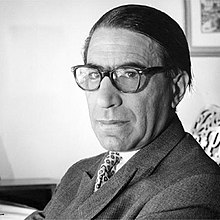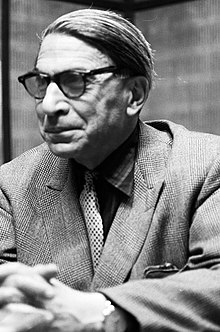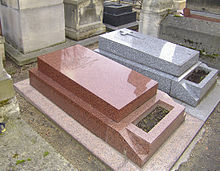music.wikisort.org - Composer
Joseph Kosma (22 October 1905 – 7 August 1969) was a Hungarian-French composer.
This article needs additional citations for verification. (June 2019) |
Joseph Kosma | |
|---|---|
 | |
| Background information | |
| Birth name | József Kozma |
| Born | 22 October 1905 |
| Origin | Budapest, Hungary |
| Died | 7 August 1969 (aged 63) France |
| Occupation(s) | Composer |
Biography
Kosma was born József Kozma in Budapest, where his parents taught stenography and typing. He had a brother, Ákos. A maternal relative was the photographer László Moholy-Nagy, and another was the conductor Georg Solti. He started to play the piano at age five, and later took piano lessons. At the age of 11, he wrote his first opera, Christmas in the Trenches. After completing his education at the Secondary Grammar School Franz-Josef, he attended the Academy of Music in Budapest, where he studied with Leo Weiner. He also studied with Béla Bartók at the Liszt Academy, receiving diplomas in composition and conducting. He won a grant to study in Berlin in 1928, where he met Lilli Apel, another musician, whom he later married. Kosma also met and studied with Hanns Eisler in Berlin. He became acquainted with Bertolt Brecht and Helene Weigel.
Kosma and his wife emigrated to Paris in 1933. Eventually, he met Jacques Prévert, who introduced him to Jean Renoir. During the 1930s Kosma teamed up with Prévert to set a number of Prévert's poems to music, and have them recorded by popular singers. Several of these were hits. Kosma also composed scores to Renoir's films including La Grande Illusion (1937), La Bête Humaine (The Human Beast, 1938), and La Règle du jeu (The Rules of the Game, 1939).

During World War II and the Occupation of France, Kosma was placed under house arrest in the Alpes-Maritimes region and was banned from composition. However, Prévert managed to arrange for Kosma to contribute music for films with other composers fronting for him. Under this arrangement, he wrote the "pantomime" of the music for Les Enfants du Paradis (1945), made under the occupation but released after the liberation. Among his other credits are the scores to Voyage Surprise (1946) and Le Testament du docteur Cordelier (The Doctor's Horrible Experiment, 1959), the last of which was made for television. He was also known for writing the standard classical-jazz piece "Les feuilles mortes" ("Autumn Leaves"), with French lyrics by Prévert and later English lyrics by Johnny Mercer, which was derived from music in Marcel Carné's film Les Portes de la Nuit (1946). The song was featured in the eponymous 1956 film starring Joan Crawford.

Selected filmography
- La Grande Illusion (1937)
- The Time of the Cherries (1938)
- Goodbye Leonard (1943)
- A Woman in the Night (1943)
- Gates of the Night (1946)
- Love Around the House (1947)
- Crossroads of Passion (1948)
- The Lovers Of Verona (1949)
- The Farm of Seven Sins (1949)
- At the Grand Balcony (1949)
- Black Jack (1950)
- Vendetta in Camargue (1950)
- Shadow and Light (1951)
- Champions Juniors (1951)
- Sins of Madeleine (1951)
- The Cape of Hope (1951)
- Crimson Curtain (1952)
- Matrimonial Agency (1952)
- Wolves Hunt at Night (1952)
- Alarm in Morocco (1953)
- Innocents in Paris (1953)
- Operation Magali (1953)
- Huis clos (1954)
- Wild Fruit (1954)
- House on the Waterfront (1955)
- Goubbiah, mon amour (1956)
- I'll Get Back to Kandara (1956)
- Three Days to Live (1957)
- The Case of Doctor Laurent (1957)
- The Cat (1958)
- A Certain Monsieur Jo (1958)
- Picnic on the Grass (1959)
- Croesus (1960)
- The Cat Shows Her Claws (1960)
External links
- Joseph Kosma at IMDb
На других языках
[de] Joseph Kosma
Joseph Kosma (* 12. Oktober 1905 in Budapest, Österreich-Ungarn; † 7. August 1969 in La Roche-Guyon, Frankreich) war ein ungarischer Komponist jüdischer Herkunft, der seit 1933 in Frankreich lebte. Er machte dort vor allem mit Filmmusiken auf sich aufmerksam. Sein bekanntestes Stück ist das Chanson auf den Text Les feuilles mortes seines Freundes, des Dichters Jacques Prévert, das zuerst von der Diseuse Cora Vaucaire, später insbesondere von Juliette Greco und Yves Montand interpretiert und, meist mit englischem Text, zu einem international rezipierten Jazzstandard wurde (Autumn Leaves).[1] Kosma komponierte außerdem die Musik für Opern, Ballette (u. a. für Roland Petit und Jean-Louis Barrault), Pantomimen (für Marcel Marceau), Bühnenstücke (für Jean-Paul Sartre, Georges Schehadé) sowie Vokalwerke, Orchesterstücke und Kammermusik.[2]- [en] Joseph Kosma
[es] Joseph Kosma
Joseph Kosma (en húngaro Kozma József, Budapest, 22 de octubre de 1905-La Roche-Guyon, Francia, 7 de agosto de 1969) fue un compositor nacido en Hungría, pero de nacionalidad francesa desde 1946.[ru] Косма, Жозеф
Жозеф Косма (фр. Joseph Kosma; 22 октября 1905, Будапешт — 7 августа 1969, Ла-Рош-Гийон) — французский композитор еврейского происхождения из Венгрии. Эмигрировал с семьей в Париж в 1933 году. Жак Превер представил его Жану Ренуару, в сотрудничестве с которым была написана музыка ко многим фильмам («Великая иллюзия», «Человек-зверь», «Адрес неизвестен», «Невиновные в Париже») а также с Марселем Карне — фильмы «Врата ночи», где впервые звучит знаменитая мелодия песни «Опавшие листья» в исполнении Ива Монтана, и «Дети райка»[4][5]. Сочинил музыку к первому варианту фильма Поля Гримо «Пастушка и трубочист» (1952 год).Другой контент может иметь иную лицензию. Перед использованием материалов сайта WikiSort.org внимательно изучите правила лицензирования конкретных элементов наполнения сайта.
WikiSort.org - проект по пересортировке и дополнению контента Википедии